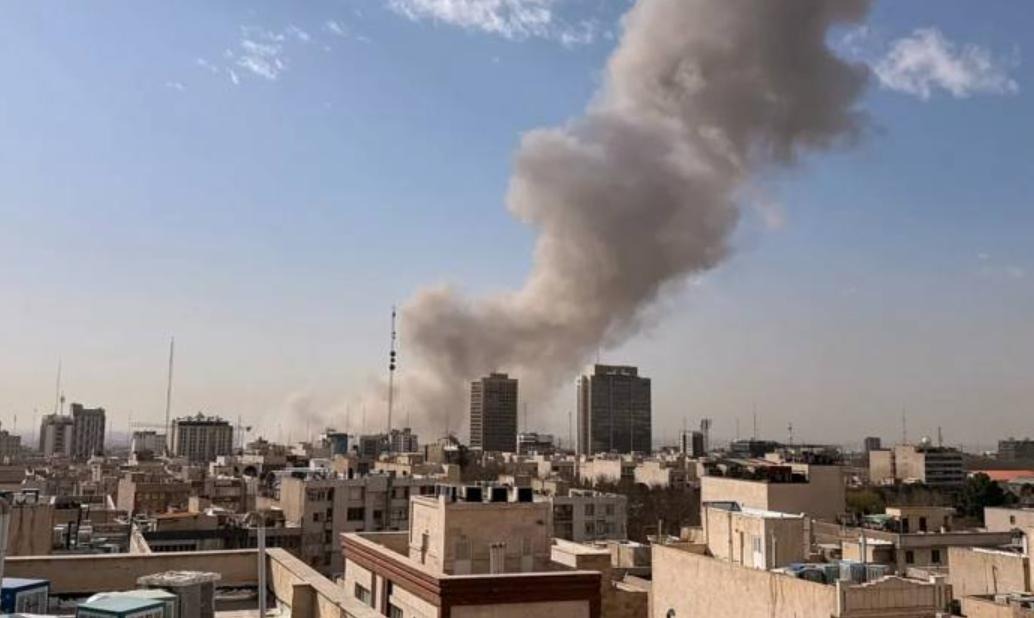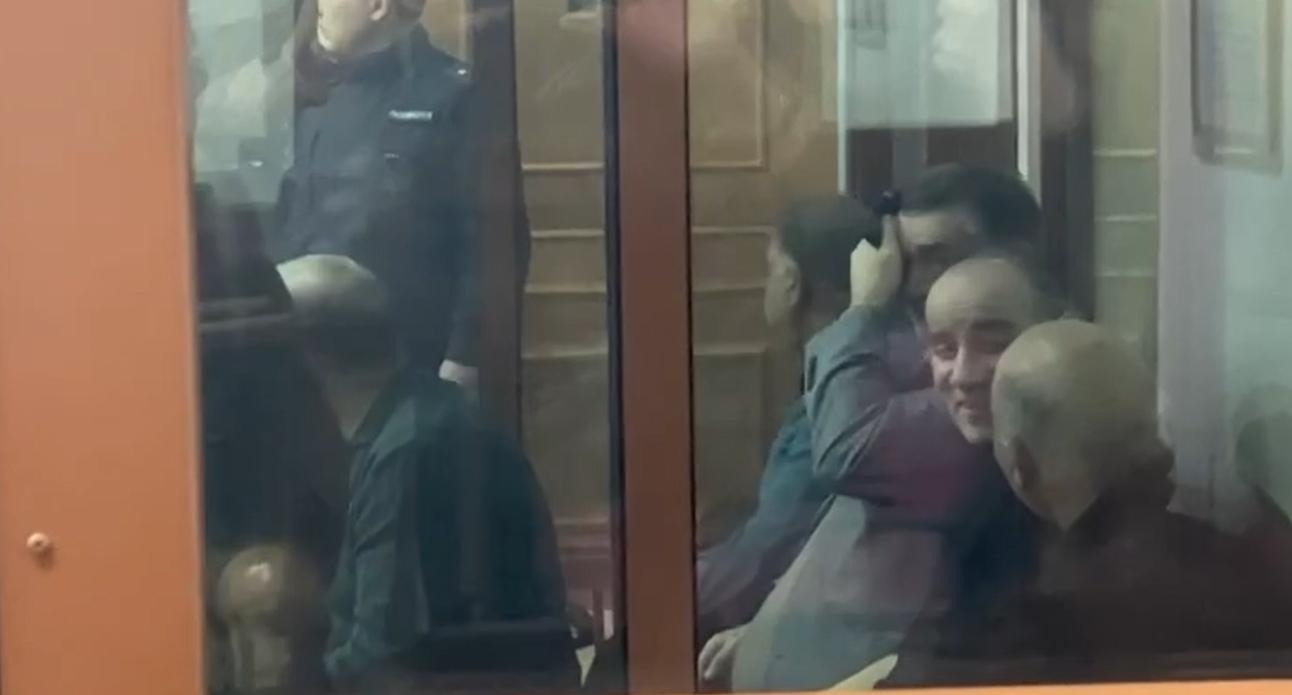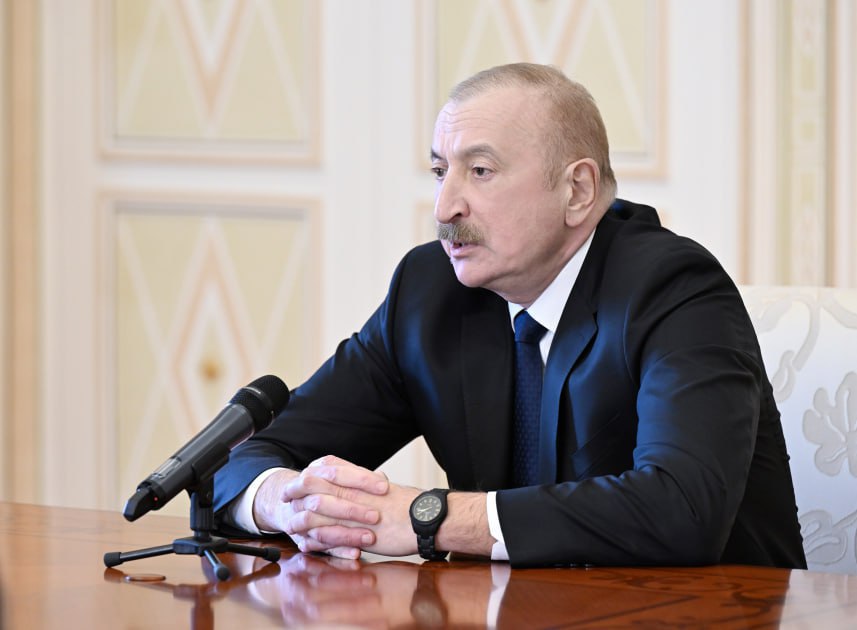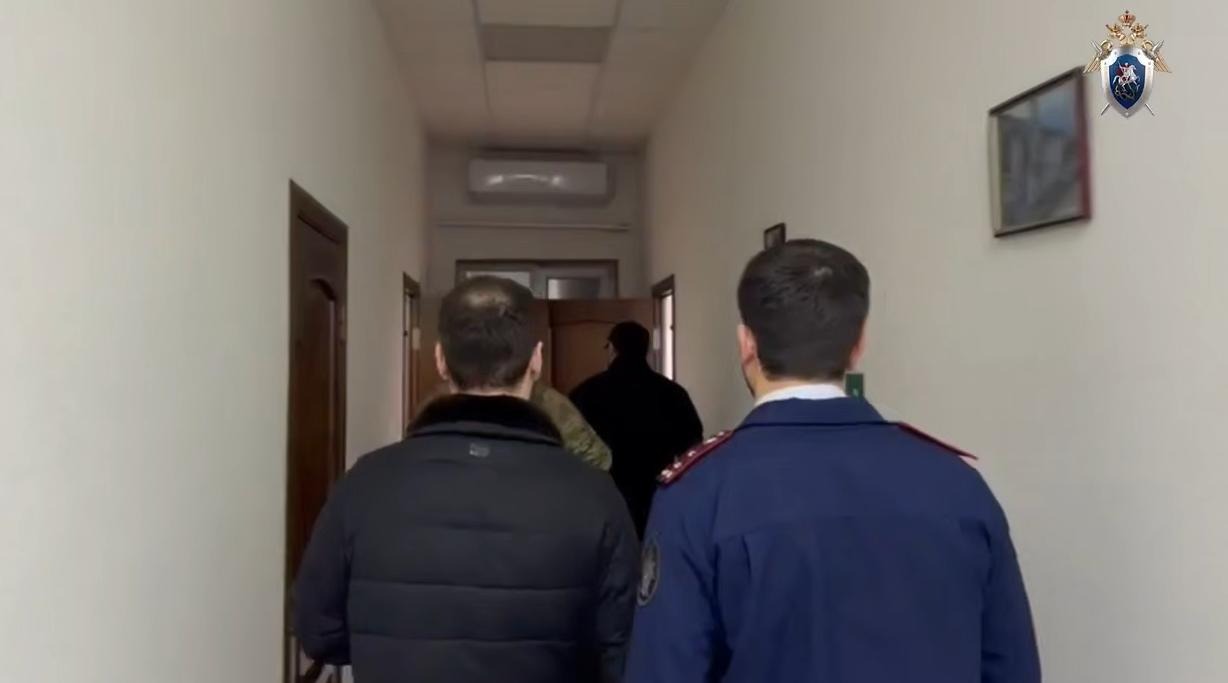On March 5, Azerbaijani President Ilham Aliyev received calls from leaders of various countries expressing solidarity with Baku in connection with the recent events. In particular, the drone attack on the Nakhchivan Autonomous Republic, carried out by Iran using unmanned aerial vehicles, was strongly condemned by Georgian Prime Minister Irakli Kobakhidze, Uzbek President Shavkat Mirziyoyev, UAE President Mohammed bin Zayed Al Nahyan, Turkish President Recep Tayyip Erdogan, and Latvian President Edgars Rinkēvičs. During the phone call, the politicians expressed support for the Azerbaijani people and wished a speedy recovery to those injured in the incident.
At the end of October, anti-Semitic protests, provoked by events in Palestine, took place in three republics of the North Caucasus. In Dagestan, rioters, outraged by the bombing of the Gaza Strip and the mass murder of Palestinian civilians, most of whom were children, seized the airport while waiting for a flight from Israel. The Kremlin said that these events were “inspired from the territory of Ukraine.” Social networks blame Islamists. Experts believe that pogroms are a completely Russian tradition.
“In Our Small, Friendly Republic”
The first noticeable anti-Israeli protest was a rally in the capital of Karachay-Cherkessia. On October 28, about a hundred people gathered in front of the government building in Cherkessk. They demanded support for Palestine, “not allowing Israeli refugees into the North Caucasus,” and “evict ethnic Jews.” Of the protesters, 34 were detained by the police, and protocols were drawn up against them for violating the rules for holding public events. Nevertheless, on October 30, another gathering took place in Cherkessk. Two dozen women held Palestinian flags, and the children they brought held a poster that read, "A people is being destroyed before the eyes of the world." The participants in the gathering said that they "do not want to live next door to Jews," and appealed to the government to "protect us from Jews moving in and coming here." In Dagestan, anti-Semites were much more active. On October 28, a crowd of people gathered near the Flamingo Hotel in Khasavyurt, where "a person outwardly resembling an Israeli citizen" was allegedly spotted. Soon, stones were thrown at the windows. The police officers who arrived demonstrated diplomatic skills unusual for the Ministry of Internal Affairs and allowed several pogromists to enter the hotel to check for Jews. Having found no one similar, the crowd went to inspect the Kiev Hotel, where there were no Israeli citizens either. A notice was posted on the doors of the Flamingo: Jews do not live in the hotel, they are prohibited from entering.
On October 29, early in the morning, an unfinished Jewish religious national and cultural community center caught fire in Nalchik. The day before, a petition appeared on the Petitions.net website addressed to the head of Kabardino-Balkaria, Kazbek Kokov, calling for an end to the construction of the center, which "could destabilize the situation in our small, friendly republic." The fire at the construction site was extinguished by seven in the morning, no one was hurt, but the inscription "Death to the Yahuds" remained on the wall of the building.
"A lavish reception"
And on the evening of October 29, mass riots began at the Makhachkala airport, "making famous" the Dagestani capital throughout the world. They were not spontaneous, but had been in preparation for at least two weeks. The first action took place on the night of October 12: when the plane from Tel Aviv arrived and its passengers began to leave the arrivals area, they were met by several men with Palestinian flags. They surrounded two Israelis, who had to resort to the help of the police.
On October 23, the TG channel "Utro Dagestan" called on Dagestanis to give the Israelis arriving in the republic a "lavish reception". This channel distinguished itself back in August, during the energy collapse in Makhachkala, with its calls to block streets. A year ago, it also called on Dagestanis to barricade against mobilization. On October 29, the channel reported that the Tel Aviv-Makhachkala flight was arriving in the evening, and it was necessary to "create a crowd and block the exit".
The flight from Ben Gurion was mainly filled with Dagestanis with children returning from treatment, but there were also Jews, Russians, and representatives of other nationalities. An Uzbek who was mistaken for an Israeli miraculously escaped reprisal. A bus with passengers from an airplane that was trying to escape from the crowd was pelted with stones. Several police officers who were trying to push the crowd off the airfield were also injured by the stones. In the airport building, retail outlets were destroyed and looted. On the approaches to the airport, "protesters" stopped cars and checked passengers' documents.
The Russian National Guard arrived to help the police. Security forces began making arrests. The airport suspended operations for almost a day. Flights from Tel Aviv were redirected to other cities. Passengers on the evening flight who were flying in transit were sent first to a military base, and then to Moscow from another airport.
The Investigative Committee opened a criminal case on mass riots. The Ministry of Internal Affairs reported that nine police officers received bodily injuries, two of them are in hospital in serious condition. The Ministry of Health of Dagestan reported 20 victims.
Social networks are to blame for everything
The head of the republic, Sergei Melikov, spoke about the events only the following day. He stated that the anti-Semitic riots were “supervised from abroad by pro-Ukrainian Telegram channels” and that “attempts to destabilize the situation in Dagestan are being carried out by our enemies, the opponents of our country.”
The press secretary of the Russian president, Dmitry Peskov, also spoke about “interference from abroad.” Putin himself also spoke less than definitively. “The events in Makhachkala last night were inspired, among other things, through social networks, not least from the territory of Ukraine, by the hands of Western intelligence agencies,” he said. However, the official representative of the Russian Foreign Ministry, Maria Zakharova, directly accused the Ukrainian intelligence services of the anti-Semitic riots. In the United States, her statement was called absurd. The representative of the State Department, Matthew Miller, called on the Russian authorities to “publicly condemn these violent actions, hold all their participants accountable, and ensure the safety of Israelis and Jews in Russia.”
On October 30, Telegram creator Pavel Durov announced the blocking of the channel "Morning Dagestan". "Channels calling for violence will be blocked for violating the rules of Telegram, Google, Apple and the entire civilized world," he noted, attaching a screenshot of the post "Morning Dagestan" as an example. This channel is administered by Dagestani Abakar Abakarov, a former editor of the website "Islam.ru", who lives abroad. But the media more often mentions the former State Duma deputy Ilya Ponomarev, who moved to Ukraine, who said that in 2022 he helped the resource financially and organizationally in order to raise a "full-fledged popular armed uprising" with its help. "After that, in the fall of 2022, the authors of this and other regional channels "Morning February" went on their own, my support for them ceased," Ponomarev now claims. One thing is clear: Abakarov does not miss a single opportunity to test his ability to mobilize radical Dagestanis, but he was best at playing on low anti-Semitic sentiments. However, his channel was not the only one that provoked people to riot, although it was the most promoted.
By the end of October 30, police officers in Dagestan identified and detained more than 80 rioters, searches were conducted in Makhachkala, and security was posted at synagogues in various cities. On October 31, the Khasavyurt court received 10 administrative protocols for violating the procedure for holding public events against participants in the gathering at Flamingo.
Three shots in the air, the fourth in the forehead
In Chechnya, they responded to the riots at the airport faster than Melikov. That same evening, Kadyrov's assistant, Minister for National Policy, External Relations, Information and Press Akhmed Dudayev made a statement that "such provocative actions will be suppressed by law and their initiators will be held accountable and punished."
"We have no right under any circumstances to project the actions of today's criminal leadership of Israel onto all Jews," Dudayev wrote on his Telegram channel. He recalled that the Chechens had personally experienced the consequences of military conflicts, and they too had been labeled bandits and terrorists. "Therefore, we have no right under any circumstances to display such aggression, or criticism, or hatred, or any attacks on representatives of this [Jewish] nationality. Such provocative actions will play into the hands of our ill-wishers, our enemies."
On October 30, Ramzan Kadyrov reported at a meeting with security forces that an attempt at such a provocation had been thwarted in the Chechen Republic the previous night. "The regional media, headed by the Minister of the Chechen Republic for National Policy, External Relations, Press and Information Akhmed Dudayev, promptly drew attention to the fake calls and warned residents against rash actions. The police and the Russian National Guard were also put on alert to respond to any provocation," Kadyrov noted.
"The Israeli regime has shown the world its true face, organizing a real mass terror against peaceful people. But we cannot follow the lead of Russia's enemies and destabilize the situation from within: we cannot hold rallies, smash airports in search of people of Jewish nationality and call for violence. We must be above all this and maintain order on our land. Such actions are unacceptable in any case and will be very harshly suppressed," the head of the Chechen Republic wrote on his Telegram channel.
At the meeting, he expressed himself even more specifically, saying in Chechen: "If even one person from us goes out to unauthorized riots, detain and imprison him. Or fire three warning shots into the air and after that, if the person does not comply with the law, fire a fourth shot into the forehead. They will not come out again."
So it was a coincidence?
Speaking about the reasons for what happened at the Makhachkala airport, analysts highlight several factors. Firstly, the Muslims of the North Caucasus feel part of the global Islamic world and sincerely worry about the Palestinians, condemning Israel's actions in the Gaza Strip. "In the North Caucasus, especially in Dagestan and Karachay-Cherkessia, many young people speak Arabic, were taught Islam in it, and read the news in Arabic. There is a very active blogosphere there, all these issues related to the war in the Middle East are actively discussed, and this really warms people up," says Ekaterina Sokiryanskaya, an expert on the North Caucasus.
Secondly, it seemed to the residents of Makhachkala that their anti-Israeli sentiments do not contradict the government's policy. Indeed, while many countries have recognized Hamas as a terrorist organization, Moscow is receiving their delegation. Vladimir Putin says he is concerned about the bombing of Gaza, but does not directly condemn the actions of Hamas. "All this has made people understand that this is an open topic, a permitted one," notes Ekaterina Sokiryanskaya. "It has been discussed for the past few weeks. Muftis have made tough statements. Thousands of Muslims are gathering in mosques in Chechnya to pray for Palestine. In mosques in Dagestan, they are praying for Gaza. This is such a rare situation when the positions of Islamist Muslims and the Kremlin coincide."
Thirdly, the Dagestani authorities have missed the situation, and ordinary security forces, being Muslims themselves, did not want to use harsh measures against the pogromists, as they do against "enemies" who come out to protest.
Fourthly, the situation in Dagestan is really close to explosive. Poverty, unemployment, high social tension, the absence of any prospects, the arbitrary actions of the authorities - all this does not contribute to stability. The republic has previously demonstrated the ability to quickly mobilize protest. People came out to protest in connection with power outages, the construction of a landfill, mobilization for war with Ukraine. In a situation where people are deprived of the opportunity to speak out in public debate and political struggle, the anger that has accumulated in society can spill out at any time and for any reason.
From an ethnographic point of view
The main slogan of the protesters was to prevent refugees from Israel, and this gave some observers a reason to say that the protests were politically anti-Israeli, not anti-Semitic. Mountain Jews, who live in Dagestan without facing oppression, were mentioned as an argument. But there are no other refugees here, except for relatives of Jews living in the republic, so the version about the political background of the protests seems untenable.
Ekaterina Sokiryanskaya believes that the level of anti-Semitism in Islamic regions of Russia may be higher than in other regions, but the events in Makhachkala, in her opinion, “are not the result of some long-standing problem with anti-Semitism, this is primarily a reaction to what is happening in the Middle East.”
Journalist and Caucasus researcher Sergei Sevrinovsky, on the contrary, believes that anti-Semitism in Dagestan and other Caucasian republics is not very different from the all-Russian one. Another thing is that people here are capable of rapid mobilization and active actions. Sociologists call this ability a coalition clinch. In conditions when political struggle and social movements were essentially banned, radically minded youth rushed into the only channel that, as it seemed to them, did not threaten accusations of extremism. On the contrary, many protesters believed that the authorities sympathized with them, and the behavior of the police in Khasavyurt and in the first hours at the airport confirmed this version.
The all-Russian information background with its hysterical assertions that enemies are all around cannot but lead to an increase in aggressive sentiments, xenophobia inevitably worsens. However, blaming the authorities for the events that took place is as absurd as placing the blame on Western intelligence agencies, says ethnographer and specialist in the social anthropology of Mountain Jews Valery Dymshits. "Of course, the authorities - central and local - bear political responsibility for everything that happens in the country and the region... But there is no direct guilt. Moreover, the authorities are the least interested in such excesses, because they: a) just praised the unique interfaith harmony that reigns in our Palestine, unlike "their" Palestine; b) fight Nazism, which is not entirely convenient to do against the backdrop of pogroms; c) most importantly, sacredly protect their monopoly on violence," notes Valery Dymshits.
In his opinion, anti-Semitism has always been and is in the Caucasus, as in any country where there is a Jewish community.
"Anti-Semitism (like other similar phobias) is not an ideology, but a dormant element of consciousness. It seems to be normal microflora, which becomes pathogenic as soon as the host organism weakens... A crisis sets in - social, economic, religious, political, or better yet, all at once - and off we go. The worst thing is if such an exacerbation happens in a society with unfinished modernization (this is precisely the North Caucasus), when the mass of the rural population continues to move to cities. The migrants retain traditional prejudices, but have lost traditional checks and balances, they are disoriented, they demand a piece of the city pie, but do not really know how to bite off this piece, they are simply poor, often without work, fed by all sorts of dubious preachers, young, easily mobilized, etc. This is Dagestan, or Egypt, or Brazil - significant, but particular. For the long-time urban population, a neighbor of a different faith is a competitor, but also a resource... For the "newcomers", a city dweller is a target, a city dweller of a different faith is a double target, -- says the ethnographer. -- The disease of under-modernized societies is the rapid growth of capital cities, so to speak, demographic obesity, because only in such cities can you get some additional resource that does not reach the periphery. Makhachkala is just one of such cities. Over the past ten years, the population has increased by one and a half times - to 600 thousand. In fact, with the suburbs - a million. A third of the population of the republic. This is a bad situation. Unhealthy. Most of them are newcomers, recent arrivals. It is clear that in such a post-colonial city it is easier to find two thousand gopniks than anywhere else."



